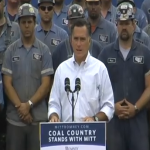 By Peter Galuszka
By Peter Galuszka
It seems such a short time ago.
In the gnarled hills of Southwest Virginia’s coalfields, prominent Republicans Ken Cuccinelli, Robert F. McDonnell and others were on the stump for Mitt Romney. The key theme was how Barack Obama’s environmental rules were putting a stranglehold over the coal industry.
A little farther north in Ohio, Robert Murray, a strident conservative and head of Murray Energy, was laying off coal miners and allegedly forcing others to attend a pro-Romney rally. It was, he said, a “drastic time” and they were in “survival mode layoffs” thanks to Obama.
Flash forward to now. While natural gas has eaten into King Coal’s share of the U.S. electricity market, the coal industry has managed to increase its exports of thermal product to Europe from 39.5 million short tons in the first months of 2011 to 51.1 million short tons in the same period of last year. The reason: while Americans enjoy cheap natural gas, Europeans are paying three times the normal rate for it.
Meanwhile, Bristol-based Alpha Natural Resources, which, to its credit, did not blame its losses last year on Obama, is expecting a bit of a recovery in the coal industry this year.
The firm lost $2.4 billion in 2012 as it suffered from big utility stockpiles thanks to a warm winter and competition from natural gas, but CEO Kevin Crutchfield expects some recovery in 2013. The firm also managed to double its exports of Eastern thermal coal to six million tons – part of the unexpected European demand. Alpha took over troubled Massey Energy, based in Richmond, in 2011.
As for Murray Energy, Obama must be doing a bad job at killing King Coal, because there are reports that Murray Energy is rehiring some miners.
True, there’s renewed interest in carbon dioxide rules that will impact coal and perhaps place it further out of marketability. But there export market is strong in Europe and Asian demand for coking coal may pick up.
Part of the problem, as Crutchfield notes, is that Central Appalachia, which includes Southwest Virginia, southern West Virginia and eastern Kentucky coalfields, is just too expensive for production, compared to Wyoming’s Powder River Basin or Northern Appalachia’s Pittsburgh seam.
All the complaining in the world about the EPA and Obama can’t change that.
Shameless self- promotion: My book, “Thunder on the Mountain: Death at Massey and the Dirty Secrets Behind Big Coal,” was reviewed by the New York Times Book Review on Feb. 10.


